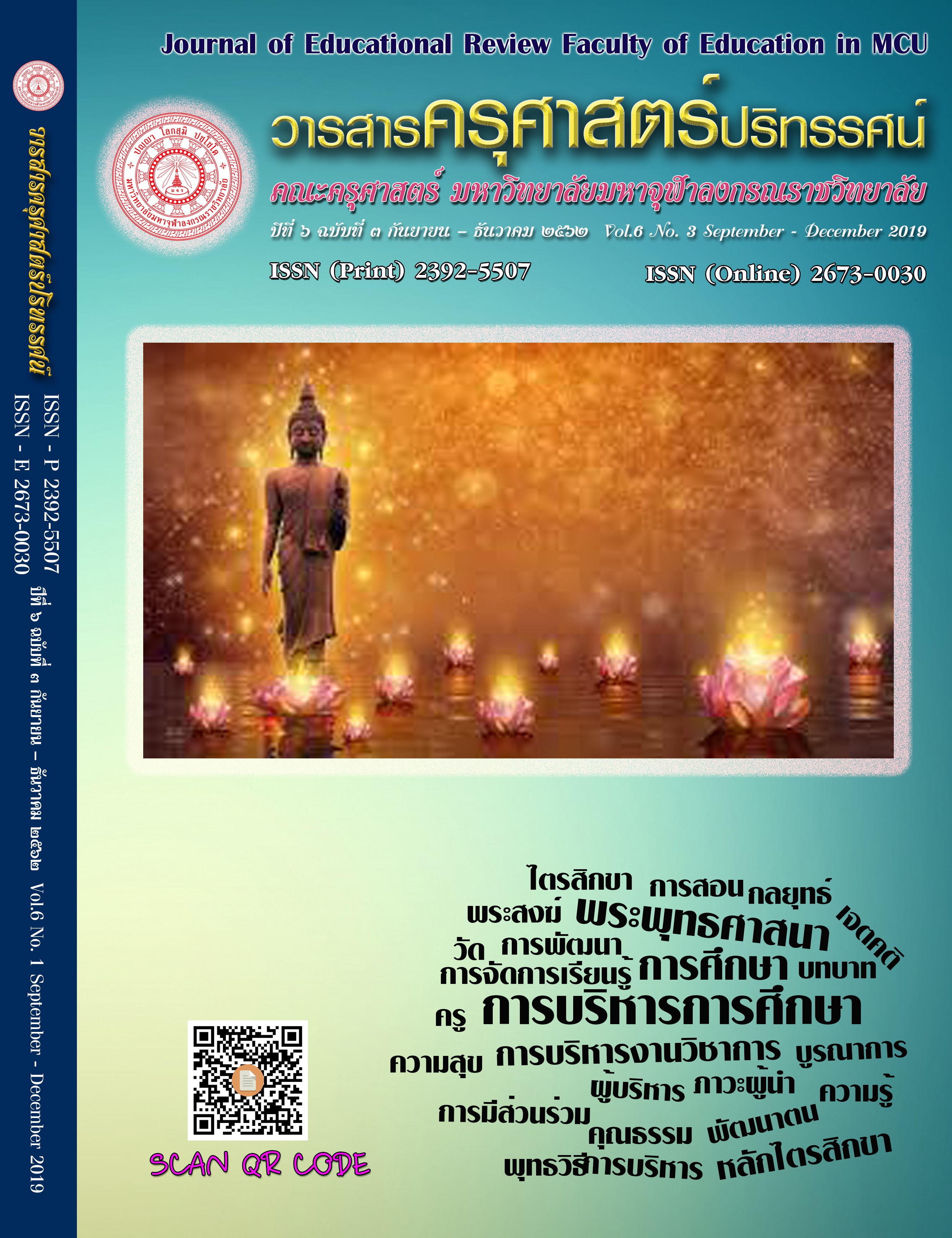THE DEVELOPMENT OF A TASK-BASED LEARNING PACKAGE TO IMPROVE ENGLISH ABILITY FOR PRATHOMSUKSA 6 STUDENTS
Main Article Content
Abstract
The purposes of this research were to develop and find the efficiency of a task-based learning packet to improve English ability of Prathomsuksa 6 students and to study the effectiveness of a task-based learning package
The the target group of this research was 15 Prathomsuksa 6 students of Nongkaeprachasun School under Kanchanaburi Primary Education Service Area office 4, and who were studying in the second semester of 2018 academic year. Two constructed parallel tests of their English ability were used as a instrument to collect data. The first one was a 40 multiple-choice pre-test, with the reliability of 0.79. and the difficulty was between 0.27-0.75. and the discrimination power was between 0.22-0.75. The second one was a 40 multiple-choice post-test, with the reliability of 0.82 and the difficulty was between 0.22-0.75. and the discrimination power was between 0.22-1.00. All items of both test had the result of Item-Objective Congruence Index was 1.00. The statistics employed for data analysis were mean, and standard deviation, and effectiveness index.
The results revealed that 1) the development of the task-based learning package consisted of 10 books a task-based of learning package, with 1 manual, and 22 plans. There was 3 steps of learning activity management, that is, pre-task, task cycle, and language focus. 2) the efficiency index evaluated by experts in connoisseurship was 3.96, with the standard deviation of 0.31, and The efficiency of process and product (E1/E2) was 76.06 / 78.89, higher than the criteria. 3) the effective index of this task-based learning package was .63, higher the criteria.
Article Details
ทัศนะและความคิดเห็นที่ปรากฏในบทความในวารสารฉบับนี้ถือเป็นความรับผิดชอบของผู้เขียนบทความนั้นเพียงผู้เดียว และไม่ถือเป็นทัศนะและความรับผิดชอบของกองบรรณาธิการ
กองบรรณาธิการขอสงวนสิทธิ์ในการคัดเลือกบทความลงตีพิมพ์และจะแจ้งให้เจ้าของบทความทราบหลังจากผู้ประเมินบทความตรวจอ่านบทความแล้ว
ต้นฉบับที่ได้รับการตีพิมพ์ในวารสารครุศาสตร์ปริทรรศน์ คณะครุศาสตร์ มหาวิทยาลัยมหาจุฬาลงกรณราชวิทยาลัย ถือเป็นกรรมสิทธิ์ของคณะครุศาสตร์ มหาวิทยาลัยมหาจุฬาลงกรณราชวิทยาลัย ห้ามนำข้อความทั้งหมดหรือบางส่วนไปพิมพ์ซ้ำ เว้นเสียแต่ว่าจะได้รับอนุญาตจากมหาวิทยาลัยฯ เป็นลายลักษณ์อักษร
References
บุญชม ศรีสะอาด. (2545). การวิจัยเบื้องต้น (พิมพ์ครั้งที่ 7 ). เอกสารประกอบการสอน
คณะศึกษาศาสตร์ มหาวิทยาลัยศิลปากร วิทยาเขตพระราชวังสนามจันทร์.
พนอ สงวนแก้ว.(2553). การพัฒนารูปแบบกิจกรรมการอ่านเน้นภาระงานเพื่อส่งเสริมความเข้าใจในการ อ่าน ภาษาอังกฤษความพึงพอใจต่อการอ่านภาษาอังกฤษแบบเพิ่มขยายและความคงทนในการเรียน. บัณฑิตวิทยาลัย มหาวิทยาลัยศิลปากร.
พรพิศ งามพงษ์. (2561).การพัฒนาผลสัมฤทธิ์ทางการเรียนวิชาภาษาอังกฤษที่เน้นภาระงานและกระบวนกลุ่มสัมพันธ์ ของนักเรียนชั้นประถมศึกษา.การประชุมวิชาการเสนอผลงานวิจัยระดับชาติ ครั้งที่ 2 “GRADUATE SCHOOL CONFERENCE 2018”.หลักสูตรศิลปศาสตรบัณฑิต สาขาภาษาอังกฤษ มหาวิทยาลัยสวนดุสิต.
พิมพันธ์ เตชะคุปต์. (2544) .การเรียนการสอนทีเน้นผู้เรียนเป็นสําคัญ : แนวคิดวิธีและ เทคนิคการสอน 1.กรุงเทพมหานคร : เดอะมาสเตอร์กรุ๊ปแมเนจเม้นท์
สถาบันทดสอบทางการศึกษาแห่งชาติ(องค์การมหาชน) (2558). รายงานผลการทดสอบทางการศึกษา ระดับชาติขั้นพื้นฐาน (O-NET) ค้นจาก https://www.niets.or.th/th/catalog/view/280
สุวิทย์ มูลคํา และสุนันทา สุนทรประเสริฐ. (2550). การพัฒนาผลงานทางวิชาการ สู่การเลื่อนวิทยฐานะ.กรุงเทพมหานคร : อีเคบุ๊คส์.
หริศักดิ์ พลตรี.(2559).ผลการใช้บทเรียนภาษาอังกฤษที่เน้นภาระงานและสาระท้องถิ่นต่อความสามารถการฟัง-พูดภาษาอังกฤษของนักเรียนชั้นมัธยมศึกษาปีที่ 1 โรงเรียนบ้านน้ำเกลี้ยง.วารสารมหาวิทยาลัยศิลปากร,9,1108-1120
อรรชนิดา หวานคง.(2559). การจัดการเรียนการสอนภาษาอังกฤษในศตวรรษที่ 21 English Teaching in the 21st Century. วารสารสถาบันวิจัยญาณสังวร, 7 , 303
Siros Izadpanah.(2016). A study on task-based language teaching: From theory to practice. Izadpanah - US-China Foreign Language, 47-56
Thorndike, Edward L. (1966) Human learning. Cambridge, Mass. : M.I.T. Press.
Willis, D. & Willis, J. (2007). Doing Tasks-based teaching. Oxford: Oxford University Press
Willis, Jane. (1996). The Framework for Task-Based Learning. London: Longman.


